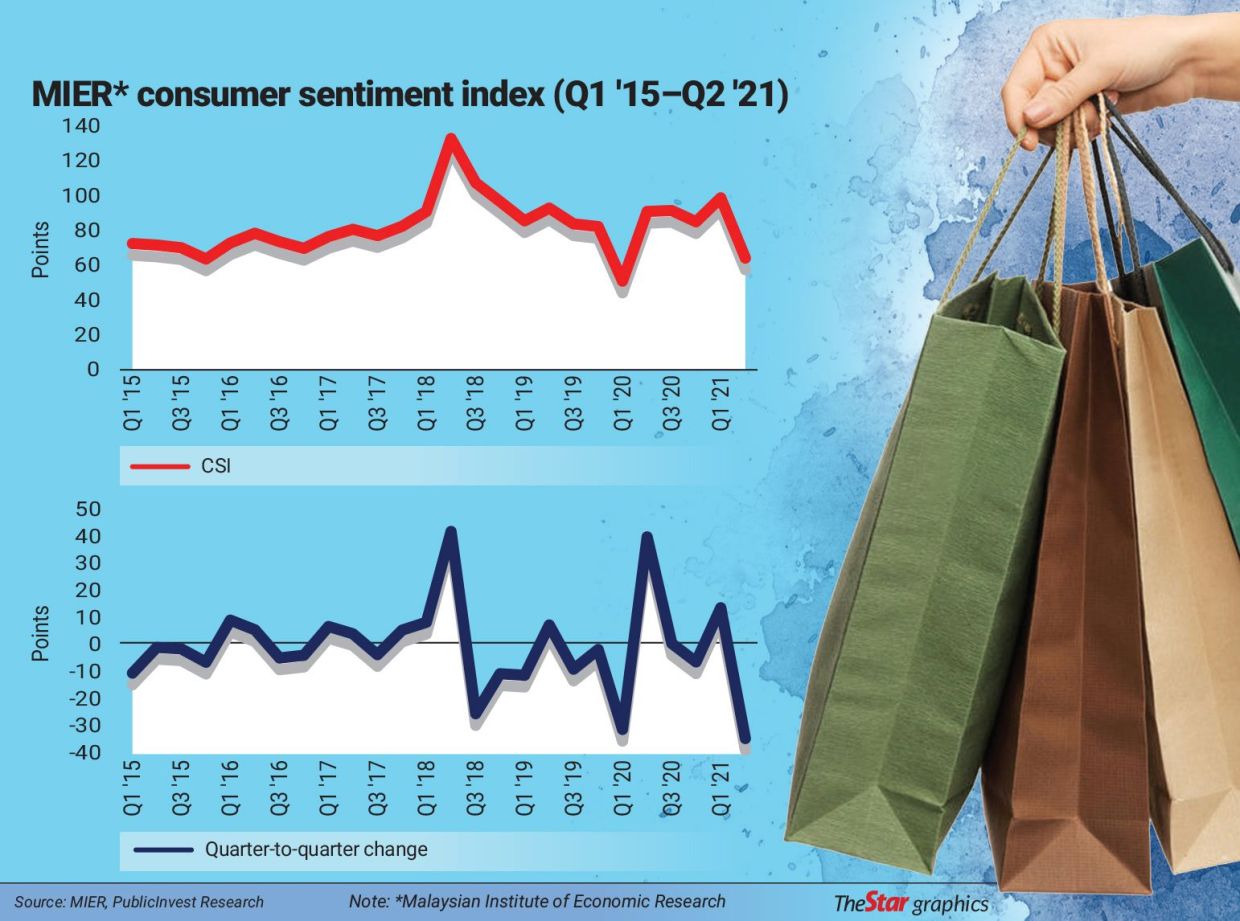Malaysia: Weak sentiment temporary
PETALING JAYA: Consumer sentiment is expected to take a hit before rebounding by year-end as the labour market continues to remain weak, fuelled by restrictions arising from the more infectious Covid-19 variants.
The Consumer Sentiment Index (CSI) suffered a pullback in the second quarter (Q2) of 2021, slipping 34.6 points to 64.3 from 98.9 points in Q1 of 2021.
This was one of the sharpest drops so far, and marked an eleventh consecutive quarter below the neutral level since Q4 of 2018.
The CSI was based on research undertaken by the Malaysian Institute of Economic Research (MIER).
According to PublicInvest Research, the sentiment was hurt by fresh lockdown measures as part of phase one of the National Recovery Plan (NRP) which started in June.
The unemployment levels, which remained elevated year-to-date (average up to May 2021: 4.7%), could continue for the remainder of the year and has dampened consumers’ spending appetite in preference for cash conservation, it said.
Bank Islam Malaysia Bhd chief economist Mohd Afzanizam Abdul Rashid (pic below) told StarBiz that judging from the number of Covid-19 cases and the limitation on human mobility as well as the constraint on businesses’ operating capacity, the CSI may continue to hover below the 100-point benchmark for quite a while.
The labour market continues to remain weak, with an elevated unemployment rate of 4.5% as at May, he said.
He said this means the income prospects would remain unexciting, hence giving more reasons for consumers to stay cautious.
Afzanizam, who is expecting consumer sentiment to pick-up by year-end, said: “The reopening of the economy holds the key for sustainable economic recovery with the vaccination programme being rapidly deployed.
“We expect consumer sentiment to pick up towards the end of the year when herd immunity is achieved and the country could proceed to the next phase under the NRP as planned.”
PublicInvest expects consumer sentiment to remain less-than-encouraging in the near term, given the still unfolding Covid-19 dynamics, especially with the emergence of Delta variant.
But this could change in Q4 of 2021, consistent expectation that herd immunity could be achieved by then, it said.
It added that a similar path of recovery had been observed in advanced economies, namely the United States and Europe, whereby their earlier vaccine accessibility has resulted in full economic openings.
Centre for Market Education CEO and Institute for Democracy and Economic Affairs (Ideas) senior fellow Carmelo Ferlito (pic below) said there must be a clear and different strategy in order to uplift consumer sentiment.
He said the strategy implemented to fight the pandemic has been very costly without bringing significant results and the political crisis has made matters worse.
“So, from one side, you have consumers who have lost their purchasing power due to unemployment etc, and on the other end, there are consumers whose purchasing power did not change but are not spending as they are cautious in doing so.
“Confidence in the leadership and adopting the right strategy can fuel consumer sentiment,” he said.
OCBC Bank economist Wellian Wiranto (pic below) said given the still-challenging resurgence of the pandemic, he does not expect any sharp uptick in consumer sentiment in the near term.
“There are hopes, however, that as Malaysia continues to ramp up its vaccination effort, we might be able to exit the worst of the bout by Q4 of 2021, which would lay the ground for a firmer recovery in consumer sentiment,” he added.
Meanwhile, MIER’s Business Condition Index (BCI) also slipped by 24.3 points to 87.50 in Q2 of 2021, snapping its last two quarters of above-neutral levels.
The current reading is its lowest in the last one year, PublicInvest said.
Sentiment was impacted by the pandemic, which had weighed on the recovery of key sectors such as hospitality, aviation and tourism, given the closure of international borders and the prohibition of inter-state travel except for special cases or work purposes.
The research house also viewed the current Phase 1 of the NRP as a dampener on the services sector, as certain segments – except for essential services such as food and beverage and healthcare – had not been allowed to operate.
“The current weak sentiment facing the index could be temporary. It is set to rebound by Q4 2021, consistent with the government’s aim to reach herd immunity and therefore, full economic openings by then.
“A return to normalcy could be a precursor for a revival in consumption and investment sentiment, a similar path of recovery we are seeing in key regions (United States and Europe), thanks to their vaccine-powered recoveries,” PublicInvest said.
When it comes to business confidence, OCBC’s Wellian said apart from improvement in the pandemic situation, it may need that extra boost from political stability and policy clarity.
Otherwise, he said, it would remain hard for businesses to have the confidence to undertake any kind of large-scale investment at this stage.
“On that front, if the September parliamentary session results in a clearer political landscape, then there might be hope for a Q4 2021 uptick in business confidence,” he noted.
Afzanizam said the BCI also moves in tandem with Malaysia’s manufacturing Purchasing Managers’ Index, which currently hovers at 40.1 points in July, below than the 50-point demarcation line.
A reading above 50 signals expansion while less than 50 means a contraction.
“Again, the reopening of the economy will be the determining factor. Without it, businesses are not able to generate sales.
“Government assistance is meant only to stabilise the situation by subsidising some of the labour costs through the wage subsidy programme,” he said.
Source: https://www.thestar.com.my/business/business-news/2021/08/09/weak-sentiment-temporary


 English
English







